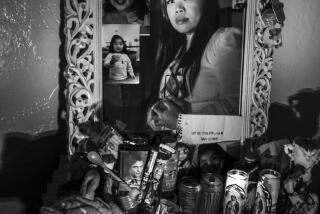Killer Couldn’t Survive the Taunts
- Share via
From what’s been reported so far, it seems clear that William Freund took some secrets to his grave. Knowing exactly why the 19-year-old killed two neighbors and then himself with shotgun blasts eight days ago requires more information than we may be able to get.
But among various dark threads running through Freund’s last several years, one is especially familiar and painfully time-worn. As reported more thoroughly on the front of this section today, Freund was the subject of mocking and derisive cruelty from his peers as far back as middle school.
They would punch his backpack. They laughed when he sneezed in class. They made him the butt of jokes. They poked fun at his clothes.
One of his sympathetic acquaintances told our reporter that Freund had been an outcast as long as she could remember.
You don’t need to be a therapist to imagine the cumulative effect that could have on a young person. All you need to be is someone who’s worked your way through the social grinder that junior high and high school can be and remember what being a social pariah can mean and what it’s like to take the taunts home with you night after night.
Obviously, most students who are bullied or mocked don’t react violently. Most survive it, at least outwardly. Freund, according to his acquaintance, “would just take it, day after day.”
That may be the saddest epitaph of all.
All this is sad-but-true commentary to Cyndie Borcoman of Newport Beach, who led a movement a few years ago to get the Newport-Mesa Unified School District to enact an anti-bullying policy. It stemmed from her son telling her that a high school friend had been choked to near-death by another student, only to have school officials blame the injury on a seizure.
“Adults say that bullying is a rite of passage,” Borcoman said last week, “and that you have to be resilient in school. Unfortunately, a lot of kids get marked in junior high and once they’re marked, they never get unmarked.”
Newport-Mesa and other districts, locally and around the country, developed more formal and tougher anti-bullying policies. But their success depends on how authorities define bullying and how consistent they are in enforcing it.
Freund’s own words make it clear he never got past it. His postings on websites are rife with references to never fitting in.
“Kids are not shown how to treat each other,” Borcoman says, “or when [others] are in pain, how to help them. Instead, they learn on TV how to put them down.”
Borcoman has been both a teacher and counselor at alternative schools that take in troubled students. It’s not unusual that new arrivals were shunned at their previous schools.
“Kids take it as much as they can,” she says of bullied victims. “Some can’t take it very much; they keep it in as much as they can.”
Most of the time, the victim suffers in silence. Much rarer, of course, are cases in which teens reach the breaking point and explode in pent-up violence.
Borcoman recommends starting anti-bully programs as early as 4th and 5th grades -- for boys and girls. The instruction should focus on discouraging youngsters from being bullies as well as letting potential victims know they can find safe port with school officials, she says.
Talk of policies and procedures sounds awfully hollow when juxtaposed with the horrible end that Freund chose for himself and his two victims.
But you can’t help but wonder when the demons first entered him. Was the fatal outburst that came at 19 the inevitable product of taunts that first surfaced years earlier?
Neither Borcoman nor I can say that for sure.
But hallway thumpings? Classroom jibes?
Rites of passage to make you tougher?
Somehow, I doubt William Freund saw it quite like that.
Dana Parsons’ column appears Wednesdays, Fridays and Sundays. He can be reached at (714) 966-7821 or at dana .parsons@latimes.com. An archive of his recent columns is at www.latimes.com/parsons.
More to Read
Sign up for Essential California
The most important California stories and recommendations in your inbox every morning.
You may occasionally receive promotional content from the Los Angeles Times.










